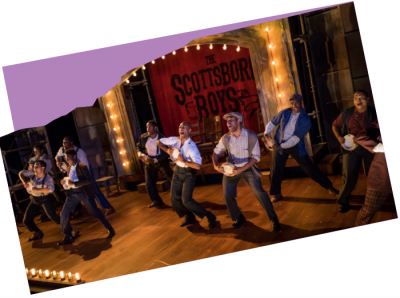Your donation sets the stage for a new season of Boston's most intimate, entertaining and provocative plays and musicals. Our shows make powerful connections with our audiences-- and they are only possible because of you.
Important Stories
Important Stories
Michael Kaye: Important Stories
 You might recognize the name “Karl Lindner,” either from memories of great American literature or recent Boston theatre. He is the one character shared by Lorraine Hansberry’s classic play A Raisin in the Sun and Bruce Norris’ Tony-winning Clybourne Park, now in its final week at SpeakEasy Stage.
You might recognize the name “Karl Lindner,” either from memories of great American literature or recent Boston theatre. He is the one character shared by Lorraine Hansberry’s classic play A Raisin in the Sun and Bruce Norris’ Tony-winning Clybourne Park, now in its final week at SpeakEasy Stage.
Actor Michael Kaye plays Lindner in Act One of Clybourne Park, which takes place in the very home the Youngers from Raisin are hoping to buy. In Act Two, which takes place fifty years later, Michael plays Steve, a new homeowner navigating the tricky terrain of racial sensitivity as he plans to demolish the now-historic house.
In our interview, Michael talks about his career as an actor and a teacher, and telling the important stories in theatre.
A lot of our audience have seen you for the first time in Clybourne Park and ask us where you’ve been hiding. So, why don’t we see you on stage more often, Michael?
The demands of my teaching position, coupled with the demands of having a young family, often mean I have to say no to opportunities. I have also worked out of town a bit.
Tell us a little bit about your background. Where did you grow up, go to school etc.?
I’m originally from Chicago. But we moved around a lot when I was young and I ended up living in Hingham, MA for high school. I went to Hingham High and then went on to receive my BFA in Acting at BU. After some time in NYC I came back to Boston and got my MFA in Theatre Ed. also at BU. Since then I have never left.
When did you know you wanted to be an actor?
Boy, I started acting when I was in middle school. I was living in Houston at the time. They had these state-wide competitions called Speech and Debate Tournaments. It was essentially acting as sport. We would do monologues and compete against other schools. I continued in high school with classes and productions. Although the social side of doing theatre was the most alluring aspect then, it quickly became clear that the act of doing theatre was an activity that made me feel like myself.
You are currently on the faculty at Boston University. Tell us about your role there.
I am an Assistant Professor of Acting and Head of the MFA Theatre Education Program.
What is the best piece of advice any of your teachers ever gave you about the craft or business of acting?
A value that they have instilled in me is to seek out rehearsal rooms where fun is being had and important stories are being told.
You have two young daughters – would you be okay if they said “Daddy, I want to be an actress?”
Yes! For my parents, to support my desire was an act of courage on their part. But for me, if my girls’ desire is to be an artist and make the world a better place, I am all for it.
How does being a father factor in to what roles you take?
It doesn’t. I look to forward to their being old enough to see me in perform in plays like Clybourne.
Do you “like” these men? And if not, is it difficult to play a character you (Michael) don’t like?
People have come up to me after the show and said, “I know people like you.” I’ve then had to introduce myself, because of course they mean my character(s). It has been interesting. My job as an actor is to tell the character’s truth, not mine, and I am comfortable with that.
Karl is the only character from “A Raisin in the Sun” to appear in “Clybourne Park”. Did you read “A Raisin in the Sun” to prepare for this role?
I played Karl Linder in Raisin in college and know the play well. It’s been a lot of fun for me to play a different version of the same character.
Shortly before I was born, my grandmother adopted a black child and brought her home to her house in a working class neighborhood of Chicago. Within weeks, someone set fire to the garage and wrote hateful epithets on the walls of the house. I grew up with this story, and with my Aunt Beth. There is a moment in the play when I, as Karl, talk about “the family that moved onto Kostner Avenue.” I always think of my grandmother and of Beth.
What do you hope audiences take away after seeing this play?
I hope the play begins a dialogue and prompts people to ask questions about race.
Where can audiences see you next?
I will be appearing in Amadeus at New Repertory Theatre in April and May, and again in Elephant Man in September and October.
 Past Productions
Past Productions The Antiquities
The Antiquities Swept Away
Swept Away




